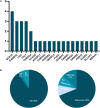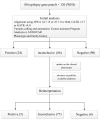Clinical Utility of Exome Sequencing and Reinterpreting Genetic Test Results in Children and Adults With Epilepsy
- PMID: 33391346
- PMCID: PMC7775549
- DOI: 10.3389/fgene.2020.591434
Clinical Utility of Exome Sequencing and Reinterpreting Genetic Test Results in Children and Adults With Epilepsy
Abstract
The clinical utility of genetic testing for epilepsy has been enhanced with the advancement of next-generation sequencing (NGS) technology along with the rapid updating of publicly available databases. The aim of this study was to evaluate the diagnostic yield of NGS and assess the value of reinterpreting genetic test results in children and adults with epilepsy. We performed genetic testing on 200 patients, including 82 children and 118 adults. The results were classified into three categories: positive, inconclusive, or negative. The reinterpretation of inconclusive results was conducted in April 2020. Overall, we identified disease-causing variants in 12% of the patients in the original analysis, and 14.5% at reinterpretation. The diagnostic yield for adults with epilepsy was similar to that for children (11 vs. 19.5%, p = 0.145). After reinterpretation, 9 of the 86 patients who initially had inconclusive results obtained a clinically significant change in diagnosis. Among these nine revised cases, five obtained positive diagnoses, representing a diagnosis rate of 5.8% (5/86). Manual searches for additional evidence of pathogenicity for candidate variants and updated patient clinical information were the main reasons for diagnostic reclassification. This study emphasizes the diagnostic potential of combining NGS and reinterpretation of inconclusive genetic test reports in children and adults with epilepsy.
Keywords: adults; epilepsy; genetic testing; next-generation sequencing; reinterpretation.
Copyright © 2020 Jiang, Song, Wang, Zhao, Yang, Gao, Leng, Man and Jiang.
Conflict of interest statement
The authors declare that the research was conducted in the absence of any commercial or financial relationships that could be construed as a potential conflict of interest.
Figures



Similar articles
-
Clinical Utility of Reinterpreting Previously Reported Genomic Epilepsy Test Results for Pediatric Patients.JAMA Pediatr. 2019 Jan 1;173(1):e182302. doi: 10.1001/jamapediatrics.2018.2302. Epub 2019 Jan 7. JAMA Pediatr. 2019. PMID: 30398534 Free PMC article.
-
Genomic testing and counseling: The contribution of next-generation sequencing to epilepsy genetics.Ann Hum Genet. 2020 Nov;84(6):431-436. doi: 10.1111/ahg.12397. Epub 2020 Jun 13. Ann Hum Genet. 2020. PMID: 32533790
-
Targeted 46-gene and clinical exome sequencing for mutations causing cardiomyopathies.Mol Cell Probes. 2015 Oct;29(5):308-14. doi: 10.1016/j.mcp.2015.05.004. Epub 2015 May 12. Mol Cell Probes. 2015. PMID: 25979592
-
Next Generation Sequencing Methods for Diagnosis of Epilepsy Syndromes.Front Genet. 2018 Feb 7;9:20. doi: 10.3389/fgene.2018.00020. eCollection 2018. Front Genet. 2018. PMID: 29467791 Free PMC article. Review.
-
Advances in genetic testing and optimization of clinical management in children and adults with epilepsy.Expert Rev Neurother. 2020 Mar;20(3):251-269. doi: 10.1080/14737175.2020.1713101. Epub 2020 Jan 27. Expert Rev Neurother. 2020. PMID: 31941393 Review.
Cited by
-
Identification of ultra-rare genetic variants in pediatric acute onset neuropsychiatric syndrome (PANS) by exome and whole genome sequencing.Sci Rep. 2022 Jun 30;12(1):11106. doi: 10.1038/s41598-022-15279-3. Sci Rep. 2022. PMID: 35773312 Free PMC article.
-
X-linked neonatal-onset epileptic encephalopathy associated with a gain-of-function variant p.R660T in GRIA3.PLoS Genet. 2021 Jun 23;17(6):e1009608. doi: 10.1371/journal.pgen.1009608. eCollection 2021 Jun. PLoS Genet. 2021. PMID: 34161333 Free PMC article.
-
Functional investigation of SCN1A deep-intronic variants activating poison exons inclusion.Hum Genet. 2023 Aug;142(8):1043-1053. doi: 10.1007/s00439-023-02564-y. Epub 2023 Apr 25. Hum Genet. 2023. PMID: 37186029
-
Diagnostic Yield and Cost-Effectiveness of "Dynamic" Exome Analysis in Epilepsy with Neurodevelopmental Disorders: A Tertiary-Center Experience in Northern Italy.Diagnostics (Basel). 2021 May 25;11(6):948. doi: 10.3390/diagnostics11060948. Diagnostics (Basel). 2021. PMID: 34070668 Free PMC article.
-
The phenotypic and genotypic spectrum of epilepsy and intellectual disability in adults: Implications for genetic testing.Epilepsia Open. 2023 Jun;8(2):497-508. doi: 10.1002/epi4.12719. Epub 2023 Mar 17. Epilepsia Open. 2023. PMID: 36896643 Free PMC article.
References
LinkOut - more resources
Full Text Sources
Miscellaneous

